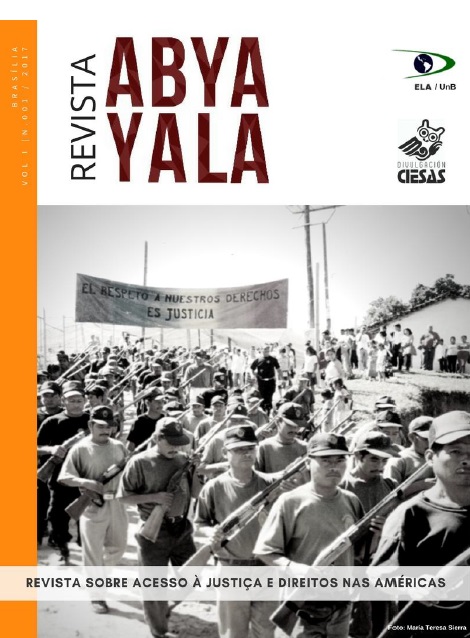Development policies and expansion of the extractive borders on Sapara territory in the Ecuadorian Amazon
Keywords:
Sapara extractivism, oil, conflictAbstract
This article deals with the conflict generated in Ecuador southeastern Amazon with the deepening of the primary-export matrix dependent on oil. The XI Round of oil tenders for 2012 is analyzed with concessions materialized in 2015 on indigenous territories, in a government aligned with post-neoliberalism or Socialism of the 21st Century. In this context and as a result of a qualitative investigation attentive to the local-national / regional-global connections, the threats of the expansion of the extractive borders on indigenous territories in the province of Pastaza are analyzed, with special attention to the case of nationality Sapara, of recent ethnogenesis. It addresses the possible impact of their livelihoods and cultural reproduction, as well as the social and organizational fragmentation that has occurred, disputes over political representation and territorial control. The research concludes that while there are leaders and communities who remain expectant of the promises of development, open to negotiate with the State, there are agencies that respond to oil extractivism from their local models of nature in defense of their territories; In this the Sapara women have played an important role, they form networks and they are articulated with women of other Amazonian nationalities configuring political ecologies.
Downloads
References
BEBBINGTON, Anthony, HUMPHREYS, Denise. “Actores y ambientalismos: conflictos socioambientales en Perú”. En: Íconos No. 35: Quito: FLACSO-Ecuador, 2009. Pp117-128
BILHAUT, Anne-Gäel El sueño de los záparas: patrimonio onírico de un pueblo de la Alta Amazonía. Quito: Abya Yala, FLACSO, 2011.
FONTAINE, Guillaume. El precio del petróleo. Conflictos socio-ambientales y gobernabilidad en la Región amazónica. Quito: FLACSO Sede Ecuador: IFEA: Abya-Yala, 2013.
GUDYNAS, Eduardo. Agropecuaria y nuevos extractivismos bajo los gobiernos progresistas de América., 2010.
HENNESSY, A. The frontier in Latin American history. Bristol: Edward Arnold,1978.
LANDER et al. Promesas en su laberinto. Cambios y continuidades en los gobiernos progresistas de América Latina. La Paz: IEE/CEDLA/CIM, 2013.
LITTLE, Paul. Amazonia. Territorial struggles on perennial frontiers. Baltimore: The John Hopkins University Press, 2001.
LÓPEZ, A.Víctor. Nuestras necesidades no son nuestras debilidades: gestión de conflictos socioambientales y defensa de derechos de los pueblos indígenas del centro sur de la Amazonía ecuatoriana. Quito: Cuzco: Flacso - Sede Ecuador; Colegio Andino. Centro de Estudios Regionales Andinos Bartolomé de las Casas, 2003.
LYON, P. - “Dislocación tribal y clasificaciones lingüísticas en la zona del Río Madre de Dios”. En Actas y memorias del XXXIX Congreso Internacional de Americanistas. Vol 5. Lima: IEP, 1975.
REEVE E. - Los Quichua del Curaray: el proceso de formación de la identidad. Quito: Abya Yala, 2002.
SAWYER S. Crude Chronicles. Indigenous politics, multinational oil, and neoliberalism in Ecuador. Durham: Duke University Press, 2004.
SVAMPA, Maristella. “Consenso de los commodities y lenguajes de valoración en América Latina”. Revista Nueva Sociedad No 244, 2013. Pp 30-46
TAUSSIG, M. Shamanism, colonialism, and the wild man. Chicago: Univesity of Chicago Press, 1987-.
TAYLOR, Anne-Christine. "Les versants orientaux des Andes septentrionales: Des Bracamoro aux Quijos”. En CASEVITZ, Renard, SAIGNES y A.C TAYLOR (comps). LÍnca, léspagnol et les sauvages: rapports entre les sociétes amazonniennes et andines du XV au XVII siècle:. Paris: Editions Recherche sur les Civilisations. 1986. PP 213-352
TAYLOR, Anne-Christine ” The western margins of Amazonia from the early sixteenth to the early nineteenth century”. En F. Salomon y S.B Schwarz (comps). The Cambridge history of the active peoples of the Americas, Vol 3, parte 2:, Cambridge, NY: Cambridge University Press, 1999. PP 188-256
TRUJILLO, Jorge. Memorias del Curaray. Quito: FEPP, 2001-
OLIVERIRA FILHO, João Pacheco.”Redimensionando a questão Indígena no Brasil: Uma etnografía das terras indígenas”. En: PACHECO DE OLIVEIRA F, João (org). Indigenismo e territorialização: poderes, rotinas e saberes no Brasil contemporáneo. Rio de Janeiro: Contra Capa Livraria. 1998.
VALLEJO, Ivette, Petróleo, desarrollo y naturaleza: aproximaciones a un escenario de ampliación de las fronteras extractivas hacia la Amazonía suroriente en el Ecuador. Anthropologica. Año XXXII/N32:115-138. Lima: PUCP, 2014.
VALLEJO, Ivette y DUHALDE, Corinne “Chamanismo, petróleo e itinerarios legales inconclusos en la Amazonía de Ecuador. En SURRALLÉS, Alexandre, ESPINOSA, Oscar y JABIN, David (eds) Apus, caciques y presidentes.Estado y política indígena amazónica en los países andinos. Lima: IWGIA.P 215-235.
WATTS, M., Petroviolence: community, extraction and political ecology of a mythic commodity. In: Violent Environments (N. Peluso & M. Watts, eds.); Ithaca: Cornell, 1999-
WHITTEN, N. Sacha Runa: Etnicidad y adaptación de los quichuas hablantes de la Amazonía ecuatoriana. Quito: Abya – Yala, 1987.
Downloads
Published
How to Cite
Issue
Section
License

This work is licensed under a Creative Commons Attribution-NonCommercial 4.0 International License.
The sending of contributions to Abya Yala implies the assignment of copyright and publication to the Journal, observing the Attribution-Non-Commercial 4.0 International (CC BY-NC 4.0) adopted.
The content of the texts submitted to and published by the journal will be the sole responsibility of their respective authors.
Copyright: https://creativecommons.org/licenses/by-nc/4.0/deed.en





